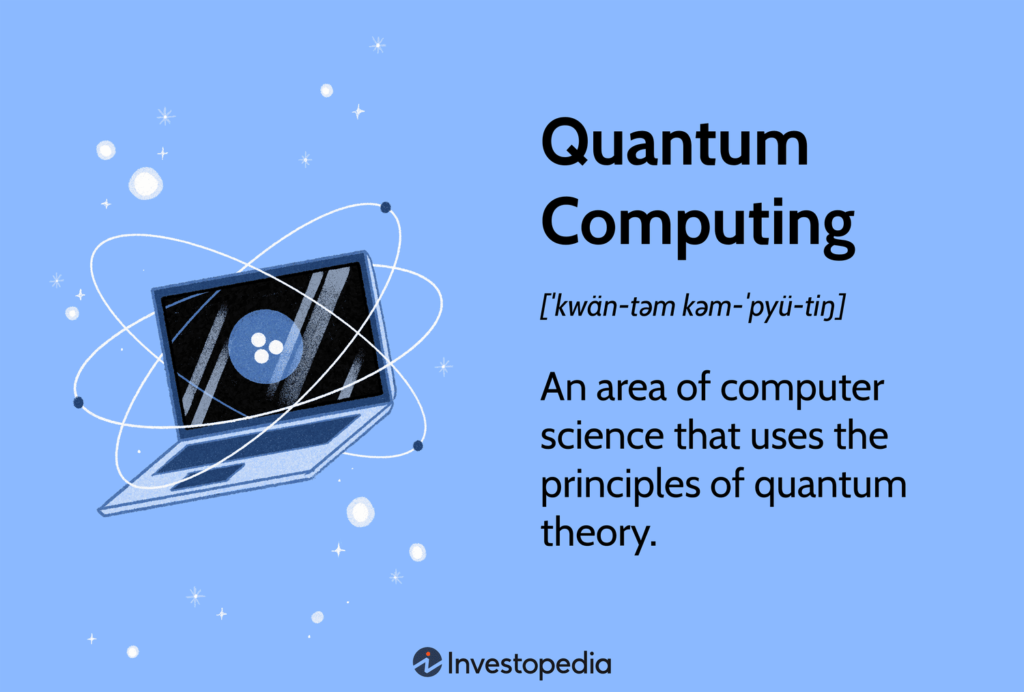Quantum computing harnesses quantum mechanics to process information in profoundly new ways. It achieves tasks that are beyond the scope of traditional computers, offering unparalleled computational speed and power.
Quantum computing represents a significant leap in technology, promising to solve complex problems that are currently intractable for classical computers. The field is a fusion of computer science, physics, and mathematics, and it’s rapidly advancing with contributions from academia and industry giants alike.
Quantum computers operate using qubits, units that process and store data in a way that allows for more efficient computation. This technology has the potential to revolutionize various sectors, including cryptography, drug discovery, financial modeling, and climate research, by performing calculations at speeds previously thought impossible. The race to fully realize quantum computing’s capabilities is a hotbed of innovation, with major tech companies and startups alike vying to unlock its transformative power.
Quantum Computing Revolution
The Quantum Computing Revolution is upon us, reshaping technology as we know it. Quantum computers are not just faster versions of regular computers; they are a leap into a future where complex problems can be solved in the blink of an eye. This revolution is powered by the principles of quantum mechanics, offering capabilities far beyond what classical computers can achieve.
The Basics Of Quantum Mechanics
Quantum mechanics is the science of the very small. It explains how particles like electrons and photons behave. Here are key points to understand:
- Particles can be in many states at once, a concept known as superposition.
- Particles can be entangled, meaning the state of one particle can depend on another, even over long distances.
- Observing a quantum state changes it, a phenomenon known as the observer effect.
These principles are what make quantum computing so powerful and different from classical computing.
How Quantum Computers Differ From Classical Ones
Classical computers use bits as the basic unit of information, which can either be a 0 or a 1. Quantum computers use quantum bits, or qubits. Let’s compare the two:
| Classical Computer | Quantum Computer |
|---|---|
| Bits hold either a 0 or a 1. | Qubits can be in a state of 0, 1, or both simultaneously. |
| Performs operations sequentially. | Performs many operations at once due to superposition. |
| Limited by binary processing. | Explores multiple possibilities at once, accelerating computation. |
Quantum computers can tackle problems considered unsolvable by classical computers. They can simulate molecules to help create new drugs, optimize complex systems, and potentially crack codes that are currently unbreakable.
The quantum computing revolution promises to change the world. It will open doors to new discoveries in every field, from medicine to cryptography to artificial intelligence. As we step into this new era, we witness the dawn of computing’s most transformative phase.
Historical Milestones
Quantum computing has transformed from a theoretical concept to a tech frontier. This journey is marked by key milestones that have paved the way for today’s advancements.
David Deutsch’s Vision
David Deutsch, a physicist at Oxford University, introduced the idea of a quantum computer in 1985. He proposed that such a machine could simulate any physical system. Deutsch’s work ignited the field and set the stage for future breakthroughs.
Quantum Computing’s Evolution
- 1994: Peter Shor developed an algorithm that could break widely used encryption codes.
- 1998: The first 2-qubit quantum computer was demonstrated, showcasing quantum computation’s potential.
- 2000s: Advances in quantum error correction emerged, improving the reliability of quantum computations.
- 2010s: Companies like IBM and Google began creating more powerful quantum processors.
- 2019: Google claimed to achieve quantum supremacy, performing a calculation beyond the reach of classical computers.
Key Players In The Quantum Arena
The race for quantum supremacy is heating up, with tech giants betting big on the future of computing. Quantum computers promise to solve complex problems much faster than classical computers. Let’s look at the key players leading this revolutionary charge.
Ibm’s Leadership
IBM stands tall as a pioneer in the quantum field. With a rich history in computing, IBM is pushing the boundaries with its quantum developments. They offer cloud-based quantum computing services and have a roadmap for scaling quantum technology.
- Quantum Experience: A platform for hands-on learning.
- Q Network: Collaboration with industry and academia.
- Quantum roadmap: A vision for future quantum computing.
Google’s Quantum Ai Initiative
Google is another major player with its Quantum AI Initiative. The company claims to have achieved quantum supremacy with its Sycamore processor. Google’s approach focuses on research and practical applications of quantum algorithms.
- Development of quantum processors.
- Research in quantum algorithms and applications.
- Partnerships with academic institutions.

Credit: iotbusinessnews.com
Quantum Computing In Action
Quantum Computing in Action reveals how this cutting-edge technology is transforming industries. Quantum computers use properties of quantum physics to solve complex problems faster than traditional computers.
Real-world Applications
Quantum computing has started to revolutionize various fields:
- Medicine: Speeding up drug discovery by simulating molecular structures.
- Finance: Optimizing portfolios and detecting fraud with unprecedented speed.
- Cybersecurity: Enhancing encryption methods to protect data more effectively.
- Logistics: Improving routing and delivery schedules, reducing costs and time.
Optimization And Simulation
These two areas showcase the power of quantum computing:
- Optimization: Quantum algorithms solve complex optimization problems quickly. This ability benefits logistics, manufacturing, and finance.
- Simulation: Quantum computers simulate physical systems that are difficult for classical computers. This is crucial in physics, chemistry, and materials science.
| Industry | Application | Benefit |
|---|---|---|
| Automotive | Material Simulation | Lighter, stronger materials |
| Energy | Grid Optimization | More efficient power distribution |
| Pharmaceuticals | Drug Development | Faster market arrival |
Challenges And Limitations
Despite quantum computing‘s potential, it faces significant challenges and limitations. Understanding these obstacles is key to harnessing quantum technology’s full power. Let’s explore the key issues.
Technical Hurdles
Building a quantum computer is no easy task. The technical hurdles are immense, making development slow and costly. Below are some of the main challenges:
- Quantum Bit (Qubit) Stability: Qubits are highly sensitive to their environment, causing errors in calculations.
- Error Correction: Advanced algorithms are required to correct inevitable errors from qubit instability.
- Scalability: Adding more qubits increases complexity exponentially, making larger systems harder to manage.
Security Concerns
Quantum computers could one day break many of the encryption methods currently in use. This creates a potential security threat that needs addressing:
| Encryption Type | Quantum Threat Level |
|---|---|
| Public Key Cryptography | High |
| Symmetric Key Algorithms | Medium |
| Hash Functions | Low |
Experts are working on quantum-resistant encryption to protect data against future quantum attacks.

Credit: www.livescience.com
Commercial Quantum Computing
Quantum computing is no longer a far-fetched fantasy. It’s moving rapidly into the commercial sphere. Businesses around the world are eyeing quantum computers for their potential to solve complex problems. These problems are beyond the reach of traditional computers. From finance to pharmaceuticals, the commercial impact of quantum computing is vast.
Emerging Market Players
As quantum technology evolves, new players are entering the market. They bring innovative solutions to the table. These emerging companies are not just startups; some are tech giants expanding into the quantum realm. They all aim to harness quantum computing’s power. Each one strives to offer unique services and products.
- Google Quantum AI: Pushing the boundaries with quantum research.
- IBM: Offering access to some of the most advanced quantum systems.
- Microsoft: Developing full-stack quantum solutions.
Quantum Computing As A Service
Quantum Computing as a Service (QCaaS) is a game-changer. It provides access to quantum computers through the cloud. This service allows companies to experiment with quantum computing. They do not need to own a quantum computer. QCaaS is making quantum computing accessible to more businesses.
| Provider | Service Offered |
|---|---|
| IBM Quantum Experience | Cloud-based quantum computing service. |
| AWS Braket | Amazon’s platform to explore and test quantum algorithms. |
| Azure Quantum | Microsoft’s cloud service offering quantum tools and resources. |
With QCaaS, you can run quantum algorithms without buying expensive hardware. Experts predict this service will grow rapidly. It will attract more sectors to explore quantum applications.
The Future Of Quantum Computing
Quantum computing represents a massive leap in processing power, harnessing the mysterious qualities of quantum mechanics to solve problems too complex for classical computers. This technology is poised to revolutionize industries, enhancing capabilities in various fields including medicine, finance, and security.
Potential Breakthroughs
The advancements in quantum computing could lead to significant breakthroughs:
- Drug Discovery: Speeding up the process to save lives.
- Climate Models: Predicting changes more accurately.
- Financial Modeling: Improving complex investment analyses.
- Cryptography: Developing unbreakable encryption.
Implications For Ai And Machine Learning
Quantum computing enhances AI and machine learning in remarkable ways:
- Faster Learning: Quantum algorithms speed up AI training.
- Complex Problems: Solving tasks classical computers can’t handle.
- Optimization: Enhancing logistics and operations for businesses.
- Pattern Recognition: Boosting capabilities in visual and speech recognition.

Credit: scienceexchange.caltech.edu
Ethical And Social Implications
Quantum computing stands on the brink of revolutionizing our world. But with great power comes great responsibility. This section explores the ethical and social challenges that we must navigate as this technology progresses.
The Quantum Divide
What is the Quantum Divide? It’s the gap between those who have access to quantum computing and those who do not.
- Global Inequality: Rich countries might get richer, leaving poor ones behind.
- Job Disruption: Quantum computers could replace jobs, changing the workforce.
- Educational Gaps: Only well-funded institutions might offer quantum education.
Regulating Quantum Technology
Why regulate? To ensure that quantum computing develops safely and fairly.
- Cybersecurity: Laws must protect against quantum attacks.
- Privacy: Quantum could break encryption, exposing data.
- Research Ethics: Guidelines needed for responsible quantum use.
Frequently Asked Questions
What Is Quantum Computing In Simple Words?
Quantum computing uses the principles of quantum mechanics to process information much faster than traditional computers.
Does Quantum Computers Exist Yet?
Yes, quantum computers do exist, but they are currently in the development and experimental stages.
How Powerful Is Quantum Computing?
Quantum computing is exceptionally powerful, capable of processing complex problems exponentially faster than classical computers.
Why Did Nasa Shut Down The Quantum Computer?
NASA shut down its quantum computer due to outdated technology and the availability of more advanced alternatives.
Conclusion
Quantum computing stands poised to revolutionize technology with unprecedented computational power. As we explore this cutting-edge field, the implications for science, industry, and security are profound. Embracing these advancements ensures we stay at the forefront of innovation. Let’s continue to watch and contribute to this exciting frontier.

